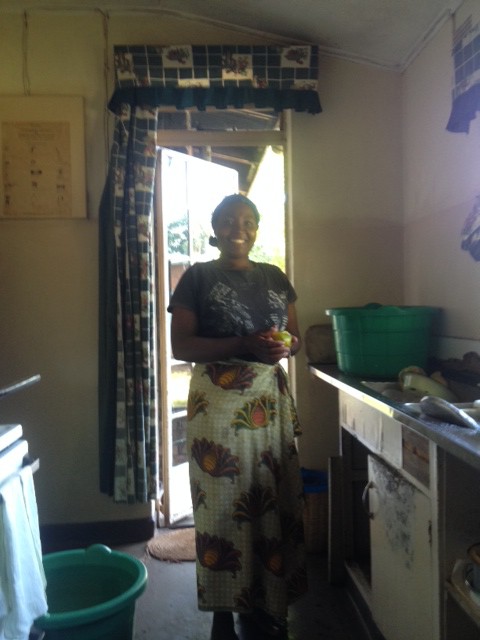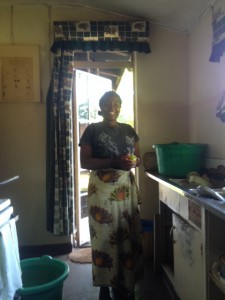My name is Loreen Kawonga. My mother is from right here in Zomba. My father was from the North. We were mainly raised by our mother. As we were growing up, there were some problems which mean that sometimes we would go and live with our father, at other times we would live with our mother.
Now my father loved education, he wanted us to go to school. But because of some other problems, what used to happen was that whenever we were staying with my father we would go to school, but whenever we went back to my mother’s we wouldn’t attend classes. We weren’t happy. My mother was often ill.
Whenever she fell sick l we would go and live with her older sister, then later on we would be told, “Oh, it’s time to go back to your mother’s home.” We just didn’t seem to have a home of our own. There was a time when she became very ill, and she left me to look after my young brothers and sisters. I am the first born of ten children, although now there are seven of us left. Yes, I actually became like a mother to some of my siblings.
So…life was difficult. Some would say, “Go to school. Others would say, “No.” And yet others, “You need to go and see your mother, you know she is not well. Who else will look after her?”
I failed school at one point. I just saw myself as someone who was too old to attend classes. That was when I was in Standard Four, soon after my mother’s illness.
I struggled in Standard Five. The same thing happened in Standard Six; my mother had found a job by this time and we were mostly alone. I started Standard Seven the first term and then…I gave up. I didn’t continue with it.
Then I got married. I was 16 at the time. I had my first-born at the age of 17. My father wrote me a letter saying, “Leave that marriage, go back to school.”
So when I told my husband, he said, “Ah, since the one who has said this is your father, you need to listen. Go back and start school. I will build a house and do other things.”
So I accepted….started off, and when I arrived in town from the village, I was told that yes, my father had actually sent another letter confirming his wishes. His plan was that I would go and live with him, and he would employ a nanny to look after my child when I went back to school. As I was preparing to make the journey to his home, I got a phone call. The message? My father had died. So I phoned my husband and told him about my father’s death.
Imagine; he died before any of his children had shown an interest in education. I feel that the fact that we had not attended school was something that really disappointed him.
Another thing..you know, the way life was in those days…our grandfather had told us, “If people from your father’s side ever come to take you, don’t ever agree to go with them. You weren’t raised by them.” And we used to say, “If they come, we will go with them, because our other fathers (father’s brothers) often complain that we don’t go to school.” And Grandfather would say, “If you go with them you will never ever come back.” So then we started thinking, “Never come back again? Never see Mother again?”and we made a decision not to go with our fathers’ brothers.
But oh, how they tried to find a way to take us with them. But it was difficult. We refused, apart from my brother, the fourth born. He hadn’t really lived with my mother, my aunt was the one who had taken care of him. So for him, it was not difficult to leave. But the rest of us decided not to go.
My grandfather died some years ago. Now, whenever we are at home, and if a child is not going to school, my grandmother likes to say, “You see…your mother didn’t go to school, and you are following in her footsteps. Fine, let’s see where that will take you.”
So we say, “But remember, you used to say we should stay here and look after mother. “and she says, “That was then. Now you need to do what is right for this day and age.” And she scolds and scolds. She is old. But she is able to read and write. And she likes ancient history, tells me where our ancestors came from; it was from Lake Chilwa.
But to go back to what happened after I learnt about my father’s death. I told my husband, and he asked me what my plans were.
I said, “Aah, that’s it, I will not go to school again…you see I don’t really know the other relatives that well….I don’t know what life would be like with them.” So I went back to my husband, we were together for the next 18 years.
As for where I am working now
, my mother was the one started working here. When she started working here I was in Blantyre. I had been away for quite some time, so when I came to Zomba I wa told that she was at Mulunguzi (an area in Zomba). And she sent for me. So I went to see her. And she told me, “I’m now working here.’
So we sat and talked about a lot of things, then I left for Blantyre again. So this became a pattern; I would come and go, and then in October-I think it was in 2000- I decided to settle in Zomba again. I gave birth to two more children. Actually my twins were born here.
Then there was a time when my mother fell ill again, and she sent a message that I should go to the place where she was working. So I was asked to take over some of her tasks; I remember I started with the laundry. And amayi (my mother’s employer) asked me if I could come every Monday, Wednesday and Thursday. So I used to come over three times a week to wash clothes. Maybe a year must have passed like that, until my mother got better.
My mother fell ill again, and the same thing happened. So after all this, my mother and her boss discussed how to go about things, and Amayi asked my mother, “Would it be okay for you to work together here with your daughter?” and my mother said, “Oh, yes. That would be good.”
So that’s when I started coming here on a daily basis. So my mother taught me everything she had been doing in the house, and that is what I do.
I wake up at five o’clock. I tend to my children before I start off for work. My two older children can fend for themselves, but I have to supervise the twins, who are eleven years old. They are a bit of a handful, you have to struggle with them before they start off for school. They can take a bath and then start playing, forgetting that they should be off to school. For instance, they can start moulding clay after taking a bath! Or sometimes they’ll start drawing, leaving their bags on the side. So you really need to be there to cajole or threaten them if they are to go to school. So I have to make sure that they have indeed left the house before I start off myself. If they stay with their older sibling it is quite a struggle.
I also sweep my own house and wash the dishes before starting off. I like washing dishes in the morning. And then I bath and head for work. I arrive here around eight-thirty or seven.
My eldest child is a girl, she is 16 and she is in secondary school. My second born is also a girl, she’s just turned 15. She’s in Standard Five, which she has repeated. And then there are the twins, a girl and a boy. When they were in Standard Two, the boy failed and the girl passed. Imagine, the girl told her twin, “Don’t worry, I’ll wait for you in the next class.” So she failed, deliberately, and her brother found her in Standard Three. They proceed together to Standard Four, and then the girl failed in Standard Five, the boy waited. So you can see why I need to keep a close eye on their school attendance.
It takes an hour and a couple of minutes for me to get from home to here. I mostly walk, although there are times when I may get a life from people who live around my area.
When I get here, I start off by washing the bathroom, and then I mop, start cleaning the living room, making sure I have dusted properly. And then I start cleaning the kitchen. After that I start cooking. I make sure that the kitchen is clean before I start cooking.
There are times when I’ll see that the living room doesn’t require much cleaning. On those days, I’ll focus on the kitchen.
I ask like watering flowers. My mother planted some flowers behind the house, and she’s always saying, “My flowers should never wilt.” So I go and water the flowers which she planted with Amayi. I also wipe the windows and clean outside. Whenever I see that a certain section of the house doesn’t look again, I clean it.
I knock off around four o’clock.
Last year, I went for a six-month course where I learnt how to sew. My mother was the one who sent me there, after she had heard that women from her church were looking for people they could train in tailoring.My mother paid for me for the first term. And for the second term, another kind woman paid my fees. We learnt how to sew dresses, how to sew half-petticoats, trousers, seat covers. We had very good teachers.
There were some things I sewed at school, but I haven’t sewn anything at home. I don’t have a sewing machine. I completed the course,but I would love to go back some day, to learn some more, because dress patterns are always changing. But tailoring is a skill.
There is a lot that we all look for in life, but I think, for me, what I would like to do is something connected to tailoring.
Translated from Chichewa by Timwa Lipenga




